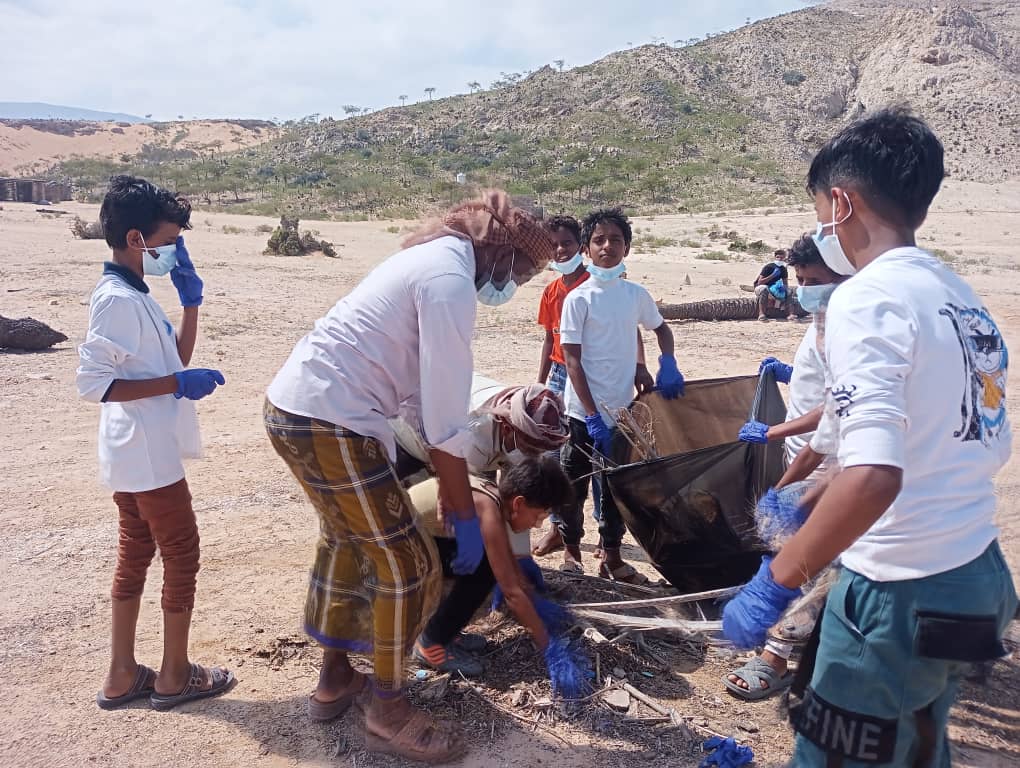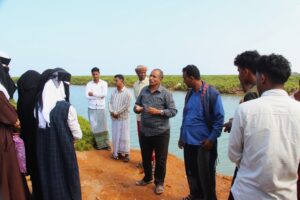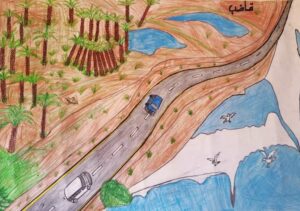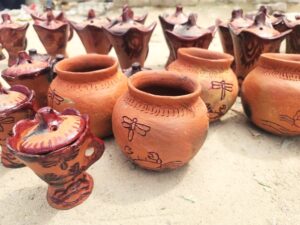Remember our previous visits to the island of Socotra, a veritable treasure trove of life located around 150 miles east of the Horn of Africa and 300 miles south of the Arabian Coast, in the Arabian Sea? We told you tales of beach cleanups, freshwater crabs and damselflies, and Yemen’s only Ramsar site – a wetland designated as a Wetland of International Importance based on certain criteria set by the Ramsar Convention on Wetlands (the Ramsar Convention is an international treaty for the conservation and sustainable use of wetlands, and was signed in Ramsar, Iran, in 1971). Socotra is also the site of an IUCN Species Survival Commission (SSC) Freshwater Conservation Committee project to contribute to the conservation of the unique freshwater fauna in the Socotra Archipelago UNESCO Natural World Heritage Site.
We’re back for another (virtual) visit with IUCN SSC Freshwater Conservation Committee member Kay van Damme. In late 2022, Kay was awarded a small SSC Internal Grant to support his work on the conservation of freshwater biodiversity in Socotra. Part of his activities with the local communities and non-governmental organizations (NGO), under the auspices of the Governor of the Socotra Archipelago and the local Environmental Protection Authority, was the delivery of a World Wetlands Day event in 2023. Given the success of this 2023 event, where local wetland conservation had come under the spotlight for the first time, more celebrations were planned for 2024.

Cleaning activity at Detwah Lagoon, Yemen’s only Ramsar Site, on World Wetlands Day 2024.
Human wellbeing and wetlands have been closely intertwined for millennia. To celebrate this vital connection, the 2024 theme for World Wetlands Day, which is organized annually and globally on February 2nd, was “Wetlands and Human Wellbeing”. Across the world, activities aimed to raise awareness specifically about the important natural and cultural linkages between human beings and wetlands – and to remind us that many wetlands are under threat from human activities. This can even be the case for those wetlands protected by well-known international conventions, such as the Ramsar Convention on Wetlands of International Importance, the UNESCO World Heritage Convention and the UNESCO Man and the Biosphere Programme. However, designation under these programs and conventions can help to increase global awareness for wetland sites. Did you know that Yemen’s only Ramsar Site, the Detwah Lagoon, can boast about a triple designation? Not only is it a Ramsar Site, but the Socotra archipelago overall is also in both a UNESCO World Heritage Site and a UNESCO Man and the Biosphere Reserve! It is probably not entirely surprising that on an island, where space is very limited, the connection between wetlands and human wellbeing becomes very tangible. People on Socotra Island strongly depend on their wetlands for water supplies, fisheries, recreation and ecotourism.
In December 2023, as a direct result of Kay’s grant-funded work, the Environmental Protection Authority (EPA, Socotra Branch) created a brand-new conservation unit, the Freshwater Wetlands and Invasive Species Unit, dedicated to the conservation and awareness raising of local aquatic ecosystems and invasive alien species. Through this new unit, and with the help of local authorities, NGOs, schools, conservationists and Kay, Socotra organized a new series of World Wetlands Day activities on the 2nd and 3rd of February, 2024.
And what a celebration it was! Conservationists, NGOs and local authorities illustrated how they can work together as a shining example for freshwater conservation awareness efforts in the Arabian Peninsula. After all, for World Wetlands Day 2024, few events happened in the Arabian Peninsula, and mostly in Oman, despite the many important aquatic ecosystems and several endangered and endemic aquatic species in the region. Socotra provided also the only event for Yemen.

Mr. Ahmed Saeed Suleiman during the field visit to Dihamd coastal wetland with school students.
All events and activities were carried out by Socotri conservationists and presented in Arabic and traditional Socotri languages. Hundreds of local secondary school, college and university students from Socotra’s education facilities talked and learned about aquatic ecosystems and how to protect them. Drawing competitions, talks and field visits were all part of the fun during World Wetlands Day. For example, one field visit led to a coastal wetland near the village of Dihamd where mangroves once were present. In the village, like in the nearby village of Ghubbah, there is a small mangrove nursery to eventually replant mangroves (Avicennia marina) where they were once abundant. In Ghubbah, such replantation of mangroves by local communities such as the Al Tamek Mangrove Association, in coordination with Friends of Socotra and EPA, has proven highly successful.

Drawing of a fragmented Sirihin Lagoon by a Socotran school student, one of the awarded drawing competition winners.
The drawing competition produced drawings both beautiful and confrontational – after all, the connection between humans and wetlands is not always positive. Check out this drawing of Sirihin Wetland (an Important Bird Area or IBA), near the Socotri capital of Hadiboh, surrounded by date palm trees and houses and fragmented by a busy road. This is reality as it is, expressed in a colorful drawing by a Socotri child, going straight to the core of the issue: if we do not take care of these wetlands, they will be gone. And so to take action and back by popular demand, just like in 2023, cleaning events were organized by Qalansiyah District authorities in Detwah Lagoon. Such cleaning events are likely to become a regular activity in years to come.
Check out the traditional local pottery designed for the occasion by the Socotran Women Association (Women Handicrafts Association of Dilfedehon). These clay pots and traditional frankincense burners were embellished with drawings of the island’s endemic freshwater crab (Socotrapotamon socotrensis) and the endemic damselfly (Azuragrion granti) using the red resin (“dragon’s blood”) of the endemic and Vulnerable Socotra Dragon’s Blood Tree (Dracaena cinnabari). The handicrafts were sold to tourists, and so in turn increasing the awareness of the importance of the Socotri aquatic biodiversity and wetlands.

Traditional pottery made by the Dilfedehon Women Association with the endemic crab and dragonfly for the occasion of World Wetlands Day 2024 illustrates the importance of the linkages between nature and culture.
The wetland conservation efforts in Socotra continue, building on the momentum created by the IUCN SSC internal grant in 2023. As a final output of the same IUCN SSC grant, the distribution and threats of several key aquatic species are now being compiled and conservation assessments are being compiled and updated. But everybody involved knows that the work is not finished, in fact, it is just beginning. Several wetlands in Socotra are threatened by urban development. Without continuous efforts and help, these important habitats will disappear.
Many thanks to all those who helped realize the freshwater conservation project in Socotra. Specifically, a huge thanks goes to Socotran conservationist Mr Ahmed Saeed Suleiman, Yemen’s National Focal Point for Ramsar and head of the new Freshwater Wetlands and Invasive Species Unit mentioned above, who coordinated many of the activities on the ground. World Wetlands Day events were organized under the auspices of Eng. Raafat Ali Al-Thaqali, the Governor of the Socotra Archipelago, in cooperation with EPA, the Department of Social Affairs & Labour, and the Department of Education, and supported by IUCN/FCC. At least four Socotri NGOs were involved, of which three are active in environmental/conservation issues (Socotra Wildlife Association, SIFESD/Socotra Islands Foundation for the Environment and Sustainable Development, and SSCEF/Socotra Society for the Conservation of Endangered Flora), and the international charity Friends of Socotra.
Published March 6, 2024